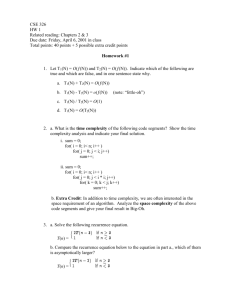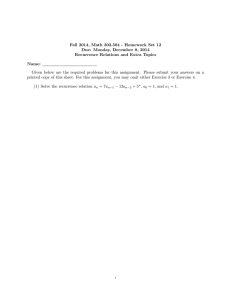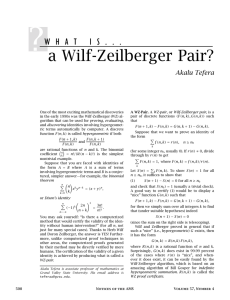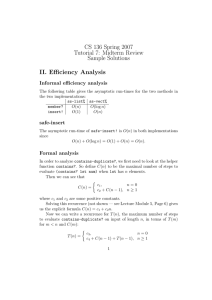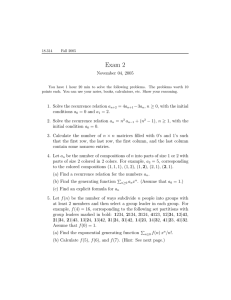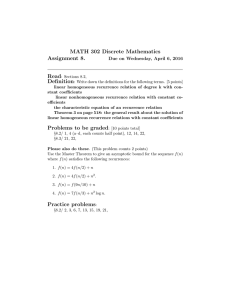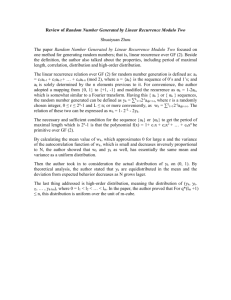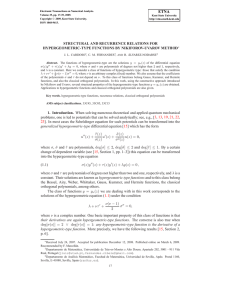Accelerated series for universal constants, by the WZ method Herbert S. Wilf
advertisement
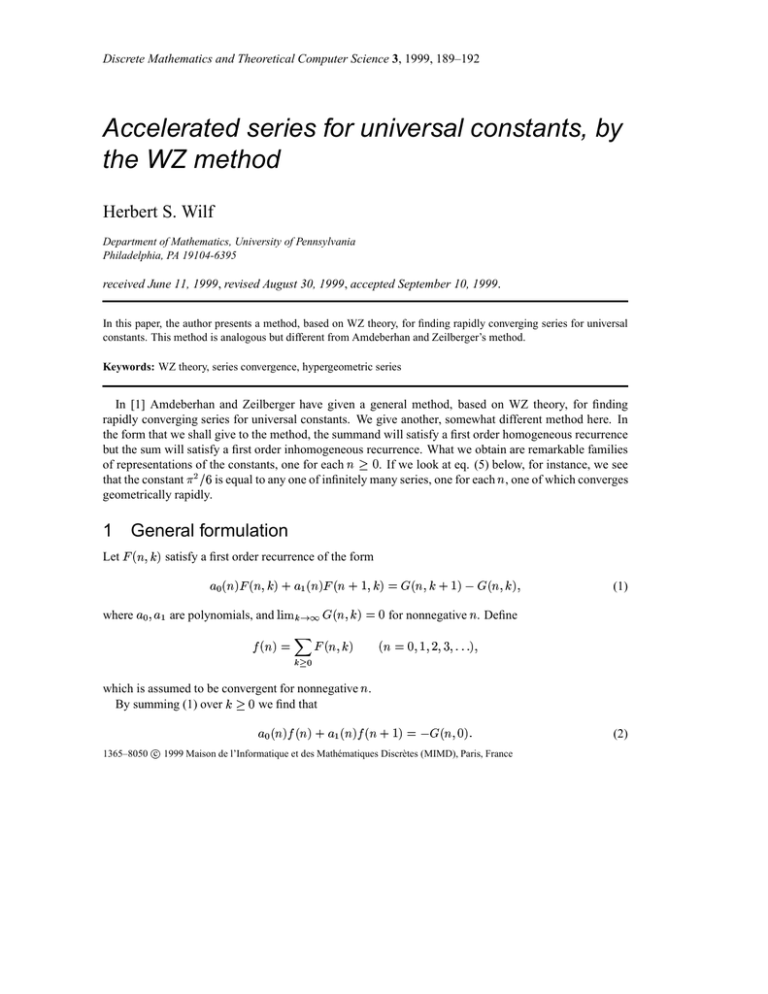
Discrete Mathematics and Theoretical Computer Science 3, 1999, 189–192
Accelerated series for universal constants, by
the WZ method
Herbert S. Wilf
Department of Mathematics, University of Pennsylvania
Philadelphia, PA 19104-6395
received June 11, 1999, revised August 30, 1999, accepted September 10, 1999.
In this paper, the author presents a method, based on WZ theory, for finding rapidly converging series for universal
constants. This method is analogous but different from Amdeberhan and Zeilberger’s method.
Keywords: WZ theory, series convergence, hypergeometric series
In [1] Amdeberhan and Zeilberger have given a general method, based on WZ theory, for finding
rapidly converging series for universal constants. We give another, somewhat different method here. In
the form that we shall give to the method, the summand will satisfy a first order homogeneous recurrence
but the sum will satisfy a first order inhomogeneous recurrence. What we obtain are remarkable families
of representations of the constants, one for each
. If we look at eq. (5) below, for instance, we see
is equal to any one of infinitely many series, one for each , one of which converges
that the constant
geometrically rapidly.
1 General formulation
Let
satisfy a first order recurrence of the form
!#"%$ &%(')$ *
where + are polynomials, and ,.-0/132&4 $ #" for nonnegative . Define
5 #"76 ! :"; <+=!3>3>;> ?
198 @A
(1)
which is assumed to be convergent for nonnegative .
By summing (1) over
we find that
G
5 B 5 C%#"D'E$ +F*>
1365–8050 c 1999 Maison de l’Informatique et des Mathématiques Discrètes (MIMD), Paris, France
(2)
190
H #"IKL J O ' 0P R Q 0P
M+N H TS in (2) it takes the form
5
then after the change of dependent variable #"
S %('US #"V' $ H + % >
Thus we have
S #"V'WIB6 J $ H .P +F% S ?
M+N .P .P
and so
5 X" H WZ Y[ 5 \'UIK6 J $ H 0P +%] ^ M+N 0P 0P _
Herbert S. Wilf
This can be “solved” by the usual methods. If we define
which is to say that
(3)
6 !X" H Z [Y 6 !(' IK6 J $ H .P F% ] ^ >
M+N .P .P _
198 91 8 We are interested in the constant
` " 6 ! *
198 so, solving for it, we have our main result which is
` " IB6 J $ .P +F 6 *>
(4)
M+N 0P H 0P % H 18 We note that
` the left side is independent of , hence we have an infinite number of representations of the
constant , one for each :"; <3>;>3> . `
Here are two examples, in one of which turns out to be RR
and in the other it is a! =F .
`
1. Take X"cb B \&cd?b . Then "D B e9 and therefore the constant " 9
.
By Zeilberger’s algorithm, satisfies the recurrence
' gf < %ih %F "$ j9\'U$ ?
where $ k" =@A=lm< . Thus we have $ FE" =@= B @n9*b , E"
' f 'o< , X" % h . By (3) we find
H X"IKL J O fP 9< Q " <Rbp ?b >
M+N .P h
Accelerated series for universal constants, by the WZ method
191
Substituting all of this in (4), we have finally
=q6 I M bR< p *b 6 &oCcb %?b " M+N P !r Ms 198 In (5), when "t we have the usual series for a! < , and when “"vu
rapidly convergent (known) representation, namely
"%= 6 4 M >
M+N P r Mws
But (5) holds for every xA . Indeed, when y"D it states that
6 & % " = ')=!>
198 (5)
” we have a much more
(6)
Bill Gosper has also found (p.c.) the identity (5) by his method of “path-invariant matrix hacking.”
#"wb h B j<RC%?b h . Then Zeilberger’s algorithm finds the recurrence
' z =<F =C% ('A ! <R% h %i{ #"$ j9('U$ ?
where now
$ +#" <RC%< }|
9 <RC~9d?b h < >
We simply substitute all of this into (4) and find that for each :";<B3>;>3> , we have
6 I 'j M+ |
;P ')< =< 'P | = 0P ?'b ?b h 'j9 I =bh ? b <R*b h 6 j<RcCb h %?b h " a! =F (7)
fz P P
M+N 198 In (7), when "t we have the usual series for a! =F , and when “"vu ” we have a much more
rapidly convergent representation, namely
=a! F#" 6 4 'j M+ |
;P 'U< =F< 'P | = 0P ?'Ab 9?b h >
(8)
fe P P
M+N But (7) holds for every xA . Indeed, when y"D it states that
6 h j9 h &< h " =<< ' = a =?
f
198 and when y"< it takes the form
6 &9 j<F j =F & j T h " | ~ a =F\' ;F~F==~ | >
f |
f
198 +
M
Although the terms of (8) vanish exponentially rapidly, roughly Mlike < J , those of the series of
Amdeberhan-Zeilberger [1] go to 0 even more rapidly, like 9F< f J .
2. Now take
192
Herbert S. Wilf
References
[1] Tewodros Amdeberhan and Doron Zeilberger, Hypergeometric series acceleration via the WZ
method, Electronic J. Combinat. 4 no. 2 (1997), #R3.
